Sarah and Sonia pile out of a rain-smattered train at Berlin Central Station, surprised they feel so rested after sleeping on Europe’s newest night train service, but also over an hour late.
“When you see the beds, they don’t look like the most comfortable ones,” said Sarah, a midwifery student from Belgium. But, pulling on their rucksacks after their journey from Brussels, the friends feel ready for a weekend of sightseeing.
They travelled with European Sleeper, a Dutch-Belgian startup whose launch in May is part of a renaissance of night train travel.
The company says there’s demand for such services, which offer a lower emissions alternative to airplanes for climate conscious travellers while bringing back some of the romance of an older and slower form of travel for enthusiasts.
But the revival faces many obstacles, from securing funding and profits amid cut-throat competition from low-cost airlines to running reliable services on Europe’s overcrowded and ageing rail network.
Sarah and Sonia’s train is a case in point. European Sleeper said it endured a time-consuming back and forth with national train operators to agree on timetables for its Brussels-to-Berlin service.
“It’s very bureaucratic and complicated,” Chris Engelsman, European Sleeper’s co-founder, told Reuters.
The company also spent a year-and-a-half scouring Europe for second-hand sleeper train coaches to rent. The refurbished couchettes in off-white and faded red had cases of faulty power sockets and broken toilets as they transported more than 20,000 people over European Sleeper’s first summer season.
In extreme cases, last-minute technical faults forced the company to downgrade some passengers to overnight seats or cancel their tickets altogether.
“The main investment that we are at the moment looking for is in the rolling stock because that is such a critical part of the whole business,” Engelsman said.
Source : Reuters


